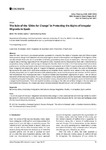The Role of the ‘Cities for Change’ in Protecting the Rights of Irregular Migrants in Spain

Use este enlace para citar
http://hdl.handle.net/2183/27834
Excepto si se señala otra cosa, la licencia del ítem se describe como Creative Commons Attribution 4.0 license (CC BY)
Colecciones
- Investigación (FSOC) [415]
Metadatos
Mostrar el registro completo del ítemTítulo
The Role of the ‘Cities for Change’ in Protecting the Rights of Irregular Migrants in SpainFecha
2021Cita bibliográfica
Fernández-Suárez, B., Espiñeira K. (2021). The Role of the ‘Cities for Change’ in Protecting the Rights of Irregular Migrants in Spain. Urban Planning, 6(2), 56-67. https://doi.org/10.17645/up.v6i2.3811
Resumen
[Abstract] Have the new municipalist pro-migrant policies succeeded in protecting the rights of irregular migrants? Cities in Spain have powers to design and implement services and programs aimed at the reception and integration of immigrants. Cities can also include those who are in vulnerable conditions, guaranteeing them access to healthcare, minimum income coverage or labour training, regardless of the immigration status. However, old municipal politics have been characterised by pragmatism, being mainly focused on regular immigrants. Besides, there has been a restrictive and punitive turn in immigration policy directly connected to the economic recession and austerity as of 2008. To explore what possibilities do cities have to expand and protect the rights of irregular immigrants, we analyse in this contribution the cases of Madrid and Barcelona for the years 2015–2019 when progressive municipalists fronts ruled the cities. Based on the textual analysis of policy documents and in-depth interviews with political parties, street-level bureaucrats and activists, we first examine the competencies that municipalities have in migration matters and mainstream approaches in Spain. Then we discuss the action of the new municipalism, focusing the analysis on four political measures that have been rebel and innovative in protecting irregular immigrants, namely, the proactive census, the prevention of irregularity, access to healthcare and changes in police protocols. These real experiences allow us to argue that cities can achieve changes in the way state control is enforced. However, the analysis also shows tensions between the political will and institutional constraints.
Palabras clave
Barcelona
Cities
Citizenship
Immigration
Institutional change
Integration
Madrid
Municipalism
Spain
Welfare
Cities
Citizenship
Immigration
Institutional change
Integration
Madrid
Municipalism
Spain
Welfare
Versión del editor
Derechos
Creative Commons Attribution 4.0 license (CC BY)
ISSN
2183-7635






